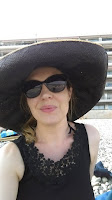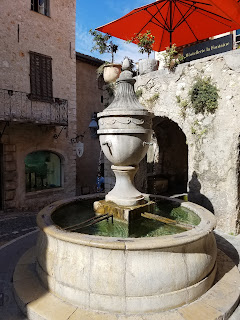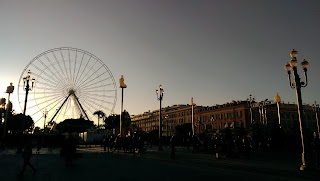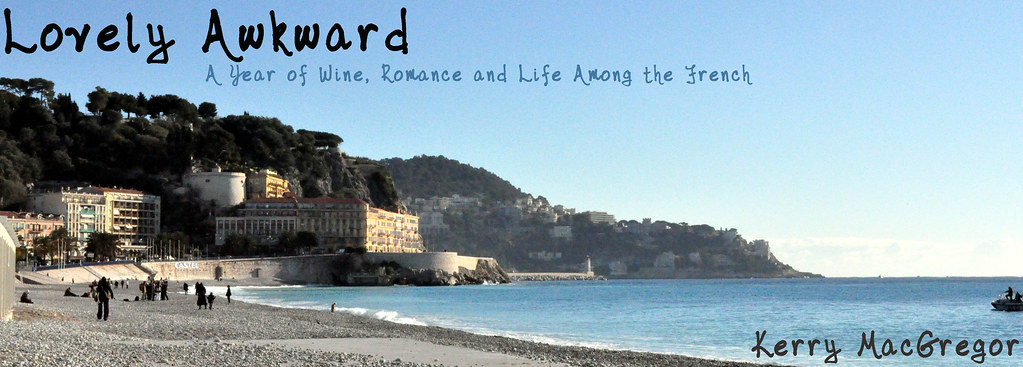 |
| On the beach in Beaulieu-sur-Mer |
I was feeling tough, powerful, and reckless—and was about to ride along the red-rock coast of the Mediterranean on the back of a motorcycle, with my arms around the waist of a man I barely understood.
 |
| The beach in Nice |
I met Stéphane, an outdoorsy French professor, on a hike through some caves in a Canadian forest. He was only visiting for two weeks that summer and would soon board a plane back to his country; I was just finishing up a contract as a reporter at the Canadian Broadcasting Corporation in Ottawa, in the same city where I'd grown up. At the airport, after only nine days of knowing each other, Stéphane had leaned forward, slipped his arm around my waist, and quietly asked me, “Will you come in Frawnce?”
I hadn't felt that I should say yes—that was ridiculous, right?—but I didn't see how I could say no. I was 33 years old, unmarried, didn't have a house or kids, and the big bubble of journalism was about to burst. What else was I going to do with the rest of my life?
And, I mean, look at these messages he sent me when his plane landed back in France:
Stéphane:
My dear love, I am pleased to offer you a wonderful trip in the fanciest
travelling wonder that the French technology can give you—to discover the
marvellous French countryside. First class, with a romantic French on your
side.
me: sounds
nice
Stéphane:
Then we'll stay in a wonderful (not so bad) hotel in the celebrated historical
city of Bordeaux.
Stéphane: And then, once fully and definitely
in addicted love with each other... I'll take you for another wonderful trip in
a 1st class train from Bordeaux to Nice, through the magnificent French
southern countryfields.
Stéphane: And then we'll make love for hours
in my recently and amazingly cleaned up place
me: so
wait, this falling in love takes only days?
Stéphane:
Well, normally with such a trip, only hours are needed, but I really want to be
sure
me: how
will you know?
Stéphane: When I'll see you crying of happiness.
I'd never gone in for Eat, Pray, Love-style journeys—I was more of an Eats, Shoots and Leaves, police thriller, post-apocalyptic kind of woman. I'd never called myself a “Francophile,” held a “salon” at my house, or dreamed of escaping to the French Riviera—I'm not even sure I knew where it was. But, I said “Hell, yes!” anyway, and then, with Stéphane's agreement, pitched our whirlwind romance as a column so I could pay for my flight. (What would you do with text messages like that? This Frenchman was hilarious! He even thought calling me “lovely awkward” was a compliment!)
 |
| (that's Santa, not me, Promenade des Anglais) |
In line at the bike shop, I was giggling nervously, clutching my future to my chest, when the man in front of me suddenly turned: “Are you Canadian? Getting a helmet? Student visa or follow a French boyfriend here?” (He was from Winnipeg.)
Crest-fallen, I mumbled that I wasn't a student. I then resolutely bought my helmet, hopped on the back of the bike, and rode off into the sunset—with my new helmet banging against the one Stéphane was wearing, because I'd never ridden a bike before and didn't know how to control my neck muscles.
Back at the beginning, we communicated in smiles. All misunderstandings were funny, and all small differences of opinion could be resolved with a view of the sun setting over the water and a nice bottle of red wine. But soon, our language barrier began to fall away ... and we discovered that there was an even bigger, scarier, cultural one behind it.
Of course, by that point, we were already married, and I was pregnant.
Uncommon ground
On a Friday, Stéphane asked me if I'd like to drive to Pisa, Italy—me, drive. I knew how to drive a car, but not one with gears I had to shift—not yet. And the driveway of our apartment in the foothills was so steep that I wouldn't have been surprised if, one day, our car had peeled off of it and tumbled backwards. I took the wheel, but nervously, worried that I'd hit a French driver and get yelled at. I didn't stall our little, grey hatch-back in the driveway, however; I did that five minutes farther down the road, smack in the middle of a busy intersection.
That's when Stéphane frantically turned in the passenger seat, his eyes wide and his cheeks as red as a Provençale sauce and yelled in my face: “Franchement! Franchement! Franchement!”
To the French, this means, “Appuie franchement!” (Floor it! Step on the gas!), but I didn't know that. Instead, I heard, “Frankly! Frankly! Frankly!” (a literal translation), as though Stéphane was suddenly about to reveal some great truth he'd been withholding up until that point in our relationship. Scared of whatever Stéphane might disclose (especially with that look on his face), and terrified of the Niçois drivers whipping around us, I'd just repeated over and over in a small, Canadian voice, “Please tell me what to do—each step ... slowly.”
Note that this is also how I'd describe our first two years of marriage—stalled at a dangerous crossroads, with both of us freaking out.
 |
| View from my writing window in Nice. |
Piled onto our cultural learning curve was the fact that my writing had also been screwing with our heads: Before our wedding, I'd been unnaturally hanging off Stéphane's every word and Stéphane had constantly been “hosting” me, along with my pencil and notebook. Having grown up as one of the subjects of my dad's widely read family columns (and hating it!), I should have seen this coming—the fact that we'd be on our best behaviour—but I didn't. How had I not understood that writing about us might cause us to gloss over important parts of our relationship? Or that publishing, posting and tweeting this story, in real time, could change it?
Sometimes I joke that Stéphane and I ended up giving ourselves an arranged marriage. Caught up in the drama of our wild, little love affair, we'd secretly eloped at the mairie in Nice's old town, only 10 months after I'd arrived. We'd been so unprepared that rather than exchanging rings (which we hadn't even thought of getting in advance), we'd bought matching Riviera hats—mostly, because after our ceremony (in which I'd answered, “I don't understand!” to the “I do” question), we'd guzzled a glass of Champagne in the midday heat of the Cours Saleya, and were afraid that we'd given ourselves sun stroke. We have one photo, taken by a security guard who was out for a smoke.
Of course, our bad planning might have to do with the context in which we'd made our big decision to commit: We'd decided this two months earlier, while I was sitting in a bathtub in an old castle in Corsica, trying to soak off a hangover, and Stéphane lay on the bed in our hotel room, holding his head. We'd gone out the night before, to a dimly lit restaurant in an old olive oil mill, where a singing Corsican dressed in black, with a red sash around his waist, had forced wine down our throats (poured it, for real), thrown our meal at us (we'd had to catch it on our plates), and had tricked a guest into firing a shotgun out the window. Drunk and trying to sneak back into the hotel in the middle of the night, I'd accidentally punched Stéphane in the face. (All that is to say neither one of us was in proper form that morning when we'd had “the big talk.”)
 |
| Saint-Paul-de-Vence |
Thus, there we were: married, stuck in an intersection with the engine stalled, and in a fight because we still didn't know each other well enough. We couldn't understand each other. Stéphane helped me turn the car back on and manoeuvre it out of the path of swerving French drivers, but we were suddenly faced with a problem we couldn't ignore: even though we'd been living in the same house for months, there was still an ocean that lay between us.
Luckily, two great things came out of the columns: The first was that I got mail—moving, heart-felt e-mails came in from women—many of them Canadians—living all over the world. Some dreamed of leaping or were ready to board planes, others had missed opportunities or had been married to their whirlwind romances for 40 years. Every story was fascinating and comforting, and all reminded me that every leap, no matter how romantic, is actually taken alone.
The second great thing was that Stéphane and I were forced to give our relationship a chance—to get over ourselves and eventually, over our cultures (well, as much as we could). If we'd been living in separate apartments and dating like normal people, any one of our cultural conflicts could have broken us up. Instead, we'd had to learn work together, like assigned lab partners—only, the experiment was us.
 |
| Downtown Nice at Christmas |
What we found especially interesting was that while we were trying to figure out how to co-exist without telling each other off, some very similar discussions were happening all across the French Republic. France, like us, was in the midst of change. This country, so heavily entrenched in its traditions, was having to ask itself some very difficult questions in the face of globalization: Should all newcomers have to adapt to France? Or should France also adapt to them.
By our fifth year of marriage, Stéphane and I had had an amazing son and a fantastic daughter. And as we were working to raise these hybrid-kids together, we began to get a very unexpected and privileged glimpse into how the citizens of our respective countries have been built, from the ground up. We took our kids on misty hikes through the ruins that look down over the perched village of Eze, dancing on the pont d'Avignon, and swimming in the electric-blue waters of the lac de Saint Cassien, near Cannes. Finally, we were learning about each other—mostly, by the way we talked to our children.
 |
| Kids on the beach in Juan-les-Pins. |
I learned that Stéphane's parents had let him fall asleep at the dinner table many nights because everyone, including children, were expected to stay at the table until everyone was done; Stéphane learned that I was raised on burritos and pizza pops warmed up in the microwave and then eaten in the car on the way to some sport. We'd each been formed under a series of learning umbrellas: there was what our parents taught us, then the influence of our surrounding communities, and then even our countries had helped us figure out how people are supposed to be in this world. We had different definitions for the words “family,” “happiness,” and “love,” and our respective cultures were backing us up: the French Wikipedia agreed with Stéphane, and the English site agreed with me. (Did you know there was more than one Wikipedia? Every day was filled with epiphanies!)
That's not to say that our cultural barrier was easy to crawl up and slide over, even in captivity (me being the most captive). A lot of the time, we weren't even sure where that cultural hump was, or how big it was, or what idiot might have put it there in the first place—kind of like stepping on a piece of Lego in the middle of the night.
 |
| The beach in Juan-les-Pins. |
But slowly, Stéphane and I were merging into a family. I like to call it our mutual “long con.” And part of the beauty of that experience, I suppose, was that neither of us yet knew it...
Many parts of the story are in this blog, but there are many parts that aren't.
Stéphane isn't the professor's real name, but today it seemed to fit.
Ugh, I do miss the Côte d'Azur. Tomorrow I will make extremely hopeful plans for another summer visit!

No comments:
Post a Comment